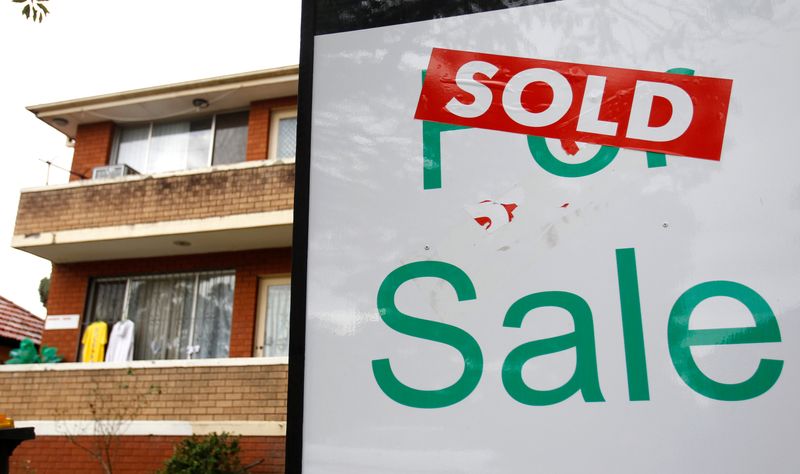By Paulina Duran and Wayne Cole
SYDNEY (Reuters) -Australia’s banking regulator on Wednesday tightened restrictions on home lending and flagged possible further action, saying rapid loan growth that has fed a surge in housing prices poses a risk to financial stability.
The Australian Prudential Regulation Authority (APRA) estimated its higher benchmark for assessing home buyers’ ability to repay loans would reduce a typical borrower’s maximum borrowing capacity by about 5%.
But given that less than one in 10 borrowers ask for the maximum loan, the vast majority of borrowers will be unaffected by the change, analysts said.
Home prices, already 20% higher than last year even with coronavirus lockdown measures in major cities, are therefore unlikely to be tamed and analysts expect further measures will be introduced.
“Increases in the share of heavily indebted borrowers, and leverage in the household sector more broadly, mean that medium-term risks to financial stability are building,” APRA Chair Wayne Byres said in a statement.
The regulator expects housing credit growth to outpace household income growth, with over a fifth of new loans approved in the June quarter already accounting for more than 6 times the borrower’s income.
In a letter to lenders, APRA said they should assess the ability of new borrowers to meet their loan repayments at an interest rate that is at least 3 percentage points above the loan product rate, up from 2.5 percentage points at present.
It also asked banks to review their risk appetite for lending at high debt-to-income levels, saying that if such lending continued to grow, it would consider further macroprudential intervention.
APRA said it would outline other capital and credit tools that it could employ in coming months, with some analysts expecting further increases to the buffer.
“We therefore view today’s announcement as a clear signal of intent … and any evidence of investor lending adding to the strong price growth we are currently seeing is likely to be firmly in APRA’s sights,” said Brendon Cooper, head of credit strategy at lender Westpac.
In the past, the regulator has applied restrictions on investor and interest-only lending.
Bank shares were mixed following the announcement, with Commonwealth Bank of Australia, the largest lender, losing 2.3%, while shares of its three biggest peers were down about 1%.
APRA said banks that continue to approve loans using the lower 2.5% buffer after October will have their capital requirements increased to reflect a higher credit risk.
(Reporting by Wayne Cole and Paulina Duran; Editing by Richard Pullin and Christopher Cushing)


























